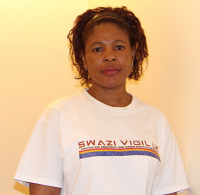Freedom of speech in Swaziland is alluded to by the Nation’s Constitution of 2005 and the government, but it is not respected or encouraged. Most Swazis have lost confidence in our justice system. If you speak up about political affairs that oppose the government, you are seen or perceived as an enemy of the kingdom and you are treated like a criminal. Most Swazis live in fear rather than making their political views known because they are not allowed to speak up [1],[2].
As Swaziland Vigil, we will continue fighting for freedom, democracy, human rights and women’s rights until we are victorious.
The country does not recognise human rights and on the contrary, it violates human rights and yet it wants to be seen and known by other countries as a peaceful country.
Political Parties were and still are banned by the king’s decree of 1973, the king is the only person who makes political, executive and judicial decisions that pertain to the country’s governance and the monarchy. I believe that people should not fear their government, once they start fearing their government, something is not right. People should have rights to voice their concerns in everything. The government should listen to the people, because it is there because of them, without them it wouldn’t exist.
The king of Swaziland is severely opposed to any form of challenge to his rule, as a consequence, he is ready to unleash the security forces on any person(s) deemed to oppose him. Opposition is violently crushed by the forces (Royal Swaziland Police) acting under direct orders from the King.
King Mswati III also uses absolute powers granted by the Swaziland 2005 constitution to enforce a ban on dissenting political views. The constitution gives the King widespread powers: political, economic and social. The King regards his rule as God-given – an opinion shared by his family and all who support him [4][5].
The King continues to spend extravagantly on the security forces much against the advice from the IMF who warned about the ever increasing size of civil service. It is believed that this continued investment in the army and police force is his way to solidify his position. Furthermore King Mswati III also regards those who oppose him as less than citizens. i.e. unSwazi, foreign backed, enemy of the state, unpatriotic and should be eliminated.
Unless there is free flow of information, rights and constitution under freedom of expression, Swaziland is incapable of making the right decisions, innocent and vulnerable people will continue to suffer under the Swazi government.
By Zodwa Dlamini
References:
-
Wikipedia, The Free Encyclopedia, Human Rights in Swaziland, http://en.wikipedia.org/wiki/Human_rights_in_Swaziland, Accessed: 7 May 2015.
-
U.S. Department of State, Diplomacy in Action, 2010 Human Rights Report: Swaziland, Bureau of Democracy, Human Rights, and Labor, http://www.state.gov/j/drl/rls/hrrpt/2010/af/154372.htm, Accessed: 7 May 2015
-
Action for Southern Africa (ACTSA), Peace, Justice, Solidarity, http://www.actsa.org/page-1518-Improving%20women%27s%20rights%20in%20Swaziland.html, Accessed: 7 May 2015
-
The Constitution of the Kingdom of Swaziland Act 2005, Page 11, Section 4, subsection 3, King and iNgwenyama.
-
The Constitution of the Kingdom of Swaziland Act 2005, Page 14, Section 4, subsection 11, Protection of King and iNgwenyama in respect of legal proceedings.
